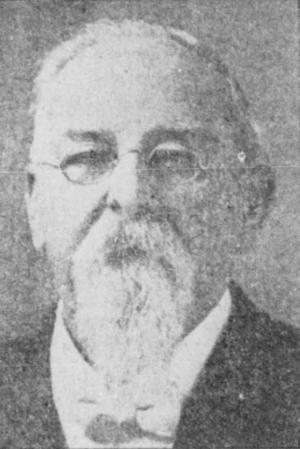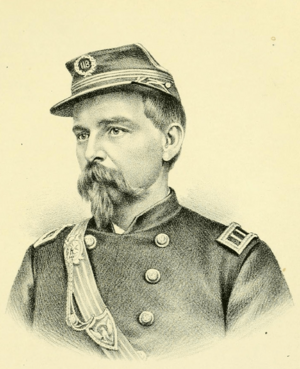Henry Conner facts for kids
Quick facts for kids
Henry Conner
|
|
|---|---|

Portrait from Vernon County Censor obituary
|
|
| Member of the Wisconsin Senate from the 31st district |
|
| In office January 5, 1891 – January 7, 1895 |
|
| Preceded by | Thomas A. Dyson |
| Succeeded by | James J. McGillivray |
| Personal details | |
| Born | April 1, 1837 West Chester, Pennsylvania, U.S. |
| Died | June 7, 1918 (aged 81) Snell Hospital, Viroqua, Wisconsin, U.S. |
| Resting place | Viroqua Cemetery, Viroqua, Wisconsin |
| Political party |
|
| Spouse |
Amanda M. Bransby
(m. 1857; died 1908) |
| Children |
|
| Occupation | Hotel & restaurant operator |
| Military service | |
| Allegiance | United States |
| Branch/service | United States Volunteers Union Army |
| Years of service | 1861–1865 |
| Rank | Captain, USV |
| Unit |
|
| Battles/wars | American Civil War |
Henry Conner (April 1, 1837 – June 7, 1918) was an American who owned hotels and restaurants. He was also a politician. He served in the Wisconsin State Senate from 1891 to 1895. During this time, he represented Vernon and La Crosse counties. Before becoming a politician, he was an officer in the Union Army during the American Civil War. He was badly wounded and lost his right leg. Sometimes, his last name was spelled Connor.
Contents
Early Life and Work
Henry Conner was born on April 1, 1837, in West Chester, Pennsylvania. His father passed away soon after he was born. His mother remarried, and he grew up with his stepfather. He received a good education during his childhood.
When he was about 14, Henry started working with mules on the Erie Canal. After three years, he returned home. He then learned to be a paper-strainer from his stepfather, who had a large paper business. However, his stepfather's business was ruined by a big economic crisis in 1857. Henry then found work with the Pennsylvania Railroad.
In 1858, Henry voted for the first time for Republican candidate Alexander Henry. Henry was running for mayor of Philadelphia. After Henry won, he appointed Henry Conner as a fireman in the city's water department.
Serving in the Civil War
In April 1861, news arrived about the Battle of Fort Sumter. This battle marked the start of the American Civil War. Henry Conner immediately left his job and joined the Union Army. He became a private in Company C of the 17th Pennsylvania Infantry Regiment. His first enlistment was for three months.
His three-month service ended in August, and he went back to Philadelphia. He briefly returned to his old job. However, a new mayor was elected, and Henry lost his position. The city's gas department, which was controlled by Republicans, offered him a new job. He worked there for nine months.
In August 1862, Henry resigned again to rejoin the Union Army. He became a private in Company G of the 118th Pennsylvania Infantry Regiment. He was quickly promoted to sergeant as the regiment was being formed. The regiment officially joined the army on August 30. They then traveled south to Washington, D.C.. There, they became part of the Army of the Potomac.
Henry fought in many important battles in the eastern part of the war. His first major battle was the Battle of Antietam. This happened less than three weeks after his regiment joined the army. In January 1863, during the Fredericksburg campaign, he was promoted to first sergeant. He later fought in the famous Battle of Gettysburg.
In January 1864, he became a second lieutenant in Company C. During the Richmond–Petersburg campaign, he was wounded in the face and neck. This happened at the Battle of Poplar Springs Church. He recovered in just six weeks. When he returned, he was promoted to first lieutenant for Company H. On March 28, 1865, he was set to become a captain of Company E. However, three days later, he was severely wounded at the Battle of Gravely Run. His right leg had to be removed above the knee. He spent the next seven months recovering in a hospital.
Life After the War
While recovering in the hospital, Henry officially left the army. He received a new job from the Philadelphia gas department as chief weightmaster. In the fall of 1866, the Republican Party chose him to run for city commissioner. He won the election in October. He served for three years. After that, he worked for the Pennsylvania Central Railroad Company for four years.
In 1878, Henry visited his daughter in Boscobel, Wisconsin. He really liked the area. He soon rented the Park Hotel in nearby Viroqua, Wisconsin. He managed this hotel for more than ten years.
Henry changed his political party and joined the Democratic Party. In 1890, he was nominated to run for the Wisconsin State Senate. He won the election that year. Many Democrats won in Wisconsin in 1890. This was partly because people were unhappy with the Bennett Law, which had been passed earlier. This law affected immigrants. Henry represented the 31st State Senate district. This district included Vernon and La Crosse counties. Henry was part of the Democratic majority that removed the Bennett Law in 1891.
Henry Conner did not run for re-election in 1894. After that, he worked as a messenger in the United States Senate for two years. He mostly retired in 1898.
He passed away at Snell Hospital in Viroqua on June 7, 1918. He had been in poor health for a long time.
Family Life
In 1857, Henry Conner married Amanda M. Bransby from Philadelphia. They had three children: Mary, John, and Henry. Only Mary survived her father. Amanda Conner passed away in 1908 after an illness.
Images for kids
 | William Lucy |
 | Charles Hayes |
 | Cleveland Robinson |




